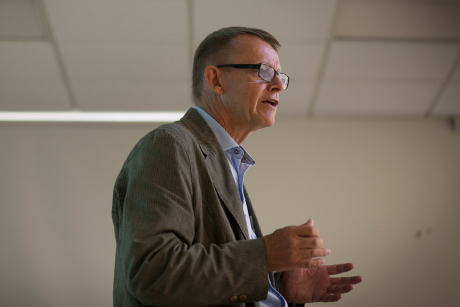Bartels Fellow Hans Rosling finds hope in numbers
By Abigail Warren

A statistician with an eye for spotting pioneering trends, Hans Rosling, a Swedish medical doctor and academic, dispels myths about the developing world. By presenting data in a captivating way, Rosling encourages millions of people to re-evaluate their understanding of the world.
Rosling, ranked as one of the world’s most 100 influential people by Time magazine in 2012, delivered a fact-based talk Sept. 9 to an engaged audience in Statler Auditorium. He spoke as the Mario Einaudi Center for International Studies’ Henry E. and Nancy Horton Bartels World Affairs Fellow.
To begin, Rosling tested the audience’s knowledge of certain development facts. He started by displaying the question:
“What is the life expectancy of the world population?”
a) 50 years
b) 60 years
c) 70 years
Using handheld clickers, 401 individuals in the audience responded to this and other multiple-choice questions. Less than 33 percent responded with the correct answer, c) 70 years.
Other questions yielded similar results. Cornellians underestimated the percentage of the world’s 1-year-old children who get vaccinated against measles and overestimated the current population of Africa.
When asked, “How many children will there be in the world in 2100,” only 17 percent of voting audience members selected the United Nation’s fact-based population projections. The majority of respondents highly overestimated the number of children predicted to be in the world in 2100.
Rosling used the exercise to highlight widespread misunderstandings of population statistics. Many people are unaware, for example, that the number of children born per woman has decreased significantly over the past 40 years across all continents, including Asia, and how this will affect world population growth in the future.
The decline in children born per woman will lead the population to “stall out at 11 billion,” Rosling explained, contradicting the belief that the population will increase exponentially over the next 100 years.
A lack of understanding of population and development statistics may lead to the incorrect assumption that “saving hungry children” in Africa and Asia will only perpetuate overpopulation and ultimately destroy the planet. Rosling refutes that assumption with data showing the “world population is going the right way,” in part due to aid and development. Also, Rosling points out that Congo and Afghanistan, the countries with the fastest population growth, are also the two countries with the highest child mortality rate.
Rosling did not ignore the environmental crisis Earth is facing. In his initial poll, Rosling revealed that 41 percent of the Cornell audience overestimated how much of the world’s energy production comes from solar and wind power.
He said that ultimately the increasing population in Africa doesn’t cause the environmental problems created by CO2 emissions. “The problem is here in America, in the United States,” Rosling said.
It’s here because the U.S. has the highest emissions rate per capita in the world. Another graphic showed that the richest billion people in the world consume about 80 percent of fossil fuels.
Rosling reiterated, “The problem isn’t the increase in the number of people in poor areas of the world,” who scarcely use fossil fuels. The problem stems from the unwise consumption of the richest part of the world, he said.
Rosling left the audience hopeful. He said: “We can find solutions” and “make investments that are resource clever.” And as a nation with some of the best scientists, information science and thinkers, the United States has the capacity and responsibility to do so.
The Henry E. and Nancy Horton Bartels World Affairs Fellowship was established in 1984 to bring prominent international leaders to Cornell to broaden Cornell students’ worldview.
Abigail Warren ’15 is a writer intern for the Chronicle.
Media Contact
Get Cornell news delivered right to your inbox.
Subscribe